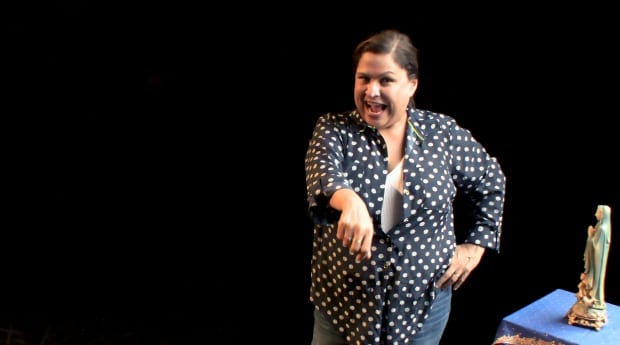Canadian comedian and actor Martha Chaves will workshop her debut play at Caminos, a new Pan-American festival of arts and culture. Called In Times of Trouble, the Nicaraguan-born performer’s one-woman show is a comedy about a lesbian who, after years of estrangement, goes back to Guatemala to care for her sick mother. The play is directed by Beatriz Pizano.
Daily Xtra caught up with Chaves for a chat about her play. What follows is an edited and condensed account of that conversation.
Daily Xtra: Does the mother in your play know that her daughter is lesbian?
Martha Chaves: The mother knows, and the daughter knows that she knows, but they don’t want to bring it up, because then the mother would have to deal with it. She’s a born-again Christian — the kind that wants to put gay people to death, like Mike Huckabee.
Is it a sort of semi-autobiographical story?
We left Nicaragua because of the revolution. I ended up in Canada as a student and stayed as a refugee [at 17 years old] . . . my parents stayed in [Guatemala] and I am here. And one of the reasons I wanted to stay here is that intuitively I knew that I could never flourish in a culture where the church is [so influential, and disapproving of LGBT people].
There is a time that I went to Guatemala and a time that I went to take care of my mother, because she had cancer in the brain . . . so it is my story, but it is also the story of a lot of people that I know — not in particular, but in general.
There are lots of elements from my own life. It is part memoir, part dream. It is also part eulogy to my mother and our relationship. All of it is garnished with my comedy. You will laugh and you will cry — probably in the right places.
What is it like for lesbians in Guatemala?
It’s not [easy] . . . but that’s not my country, remember — I am from Nicaragua. But my siblings, who are in Guatemala, they know also [that I’m a lesbian] but it’s something we don’t talk about. They know of my partner — I’ve been with a woman for five years. I don’t hide it, but I don’t yet know how they would treat my partner, because my brother is a fundamentalist Christian minister.
When I went because my mother was sick with cancer in the brain it was very trying, because, in a way, I was kind of the outcast. There was a minister from Tennessee who came to pray for my mother’s health . . . and the first thing he said was, “We have to pray, because the homosexuals are coming!” And a lot of people that suspected or knew looked at me and I left.
Is it important to you that your play is in Caminos?
I think it is important for me to finally come out to my community. When I do a Latin show, it’s not that I’m hidden — I don’t invent that I have boyfriends or anything like that — but I haven’t been out. I wanted to bring the subject to the Latin community, because it’s important. There are Latin children who are still not out to their parents.
[Another reason is that] Spanish women that are not gorgeous, like me, you will get [cast as] the cleaning lady, the welfare mother, the crack whore — I don’t play many crack whores, because I am fat. Or the last one I played was the owner of a bordello. I think it’s important for us people with accents and different ethnicities to have a venue that we can create our own work, and we don’t have to take demeaning and stereotypical roles.
Caminos
Tuesday, Nov 3–Sunday, Nov 8, 2015
Daniels Spectrum, 585 Dundas St E, Toronto
caminos.ca


 Why you can trust Xtra
Why you can trust Xtra


